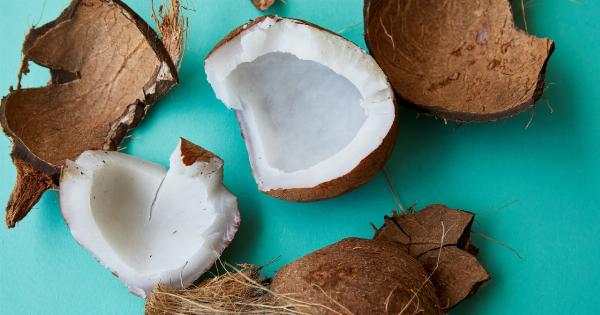Coconut bladder, also known as urinary bladder stone or bladder calculi, is a condition characterized by the formation of hard mineral and salt deposits in the urinary bladder.
These deposits can range in size from tiny particles to large stones that can cause intense pain and discomfort. While coconut bladder is a relatively rare condition, it can have a significant impact on a person’s quality of life. In this article, we will explore the natural remedies and medical treatments available for coconut bladder.
Causes of Coconut Bladder
The formation of bladder stones can be attributed to several factors, including:.
- Dietary factors: Consuming a diet high in calcium oxalate, uric acid, or certain minerals can increase the risk of developing coconut bladder.
- Dehydration: Insufficient water intake can lead to concentrated urine, which increases the likelihood of stone formation in the bladder.
- Urinary tract infections: Chronic infections can cause the crystallization of minerals in the bladder, leading to the formation of stones.
- Underlying medical conditions: Some medical conditions, such as gout or urinary tract abnormalities, can contribute to the development of bladder stones.
Symptoms of Coconut Bladder
The symptoms of coconut bladder can vary depending on the size and location of the stones. Common symptoms include:.
- Intense pain in the lower abdomen or back.
- Frequent urge to urinate.
- Blood in urine.
- Cloudy or foul-smelling urine.
- Difficulty or pain during urination.
If you experience any of these symptoms, it is essential to consult a healthcare professional for an accurate diagnosis and appropriate treatment.
Natural Remedies for Coconut Bladder
While medical intervention may be necessary in severe cases, there are several natural remedies that can complement the treatment of coconut bladder. These remedies may help alleviate symptoms and promote bladder health:.
1. Increase Fluid Intake
Drinking an ample amount of water and fluids can help dilute the urine, reducing the concentration of minerals that contribute to stone formation. Aim to drink at least 8-10 glasses of water per day.
2. Citrus Fruits
Citrus fruits, such as oranges and lemons, are rich in citric acid. Citric acid can help prevent the formation of certain types of kidney stones, including those that can form in the bladder.
Consider incorporating citrus fruits or juices into your daily diet.
3. Avoid Foods High in Oxalate
Oxalate-rich foods, such as spinach, beets, and rhubarb, can increase the risk of developing bladder stones. Limiting the consumption of these foods may help prevent stone formation.
Consult a healthcare professional or dietitian for guidance on a low-oxalate diet.
4. Herbal Supplements
Several herbal supplements, such as cranberry extract and dandelion root, have been traditionally used to support urinary tract health. These supplements may have diuretic properties and help reduce inflammation in the bladder.
However, it is crucial to consult a healthcare professional before starting any herbal supplement.
5. Maintain a Healthy Weight
Being overweight or obese can increase the risk of developing bladder stones. Achieving and maintaining a healthy weight through a balanced diet and regular exercise may help reduce this risk.
Medical Treatments for Coconut Bladder
In severe cases or when natural remedies do not provide sufficient relief, medical intervention may be required to treat coconut bladder. The appropriate treatment option will depend on the size, location, and composition of the bladder stones.
The following medical treatments may be considered:.
1. Extracorporeal Shock Wave Lithotripsy (ESWL)
ESWL is a non-invasive procedure that uses shock waves to break up bladder stones into smaller fragments, making them easier to pass through urine. This procedure is generally well-tolerated and avoids the need for surgical intervention.
2. Surgical Removal
In some cases, surgical intervention may be necessary to remove large bladder stones.
This procedure, known as a cystolitholapaxy, involves inserting a small tube with a camera into the bladder and using surgical instruments to break up or remove the stones.
3. Medications
Certain medications may be prescribed to help dissolve specific types of bladder stones. These medications work by altering the chemical composition of the urine, preventing further stone formation.
However, their effectiveness varies depending on the type of stone.
4. Bladder Irrigation
In cases where the bladder stones cause severe inflammation or infection, bladder irrigation may be performed. This procedure involves continuously flushing the bladder with a sterile solution to remove debris and promote healing.
Prevention of Coconut Bladder
Preventing the recurrence of coconut bladder is crucial to maintaining urinary tract health. Here are some preventive measures to consider:.
1. Hydration
Ensure an adequate intake of water and fluids to maintain proper hydration. Drinking enough water helps flush out toxins and prevents the concentration of minerals in the bladder.
2. Balanced Diet
Adopt a balanced diet that includes a variety of fruits, vegetables, whole grains, and lean proteins. Limit the consumption of foods high in oxalate and excessive salt, as they can contribute to stone formation.
3. Regular Urination
Avoid holding urine for prolonged periods. Emptying the bladder regularly reduces the risk of mineral buildup and stone formation.
4. Follow Medical Advice
If you have a history of coconut bladder or other urinary tract issues, it is crucial to follow your healthcare professional’s advice regarding treatment plans, dietary guidelines, and lifestyle modifications.
Conclusion
Coconut bladder, characterized by the formation of hard mineral and salt deposits in the urinary bladder, can be a source of significant discomfort and pain.
While natural remedies can help alleviate symptoms and promote urinary tract health, medical treatment may be necessary in severe cases. Preventive measures such as hydration, a balanced diet, and regular urination are essential to reduce the risk of recurrence.
By following a comprehensive approach that combines natural remedies, medical treatments, and preventive strategies, individuals can effectively manage and prevent coconut bladder.






























